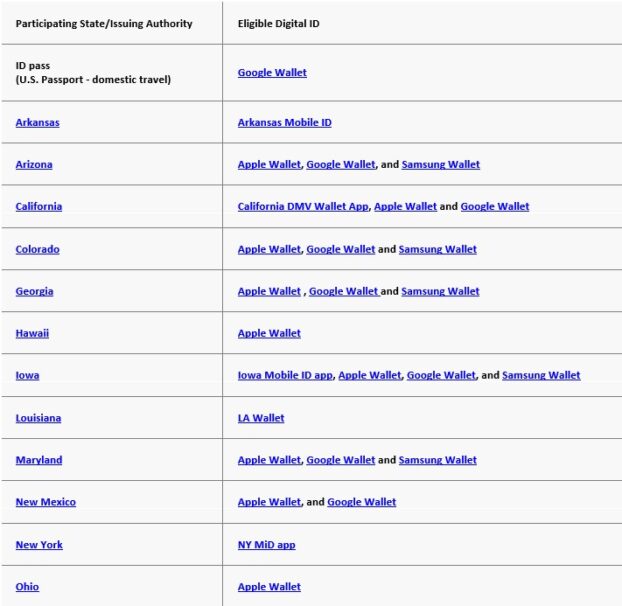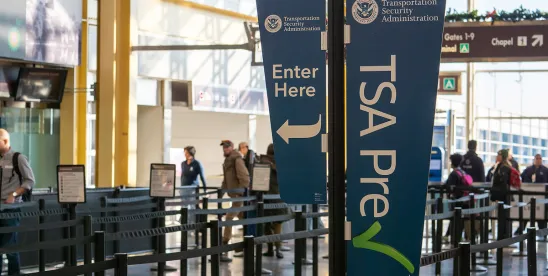The Transportation Security Administration (TSA) now allows travelers to use mobile driver’s licenses (mDLs) or state-issued digital IDs stored in apps or digital wallets at over 250 TSA checkpoints nationwide. Travelers, however, may wish to still carry a physical ID as a backup.
Participating States and Their Supported Digital ID Platforms


Key Takeaways
- TSA confirms digital IDs from certain states meet the ID requirements for domestic travel.
- ID requirements remain unchanged; the announcement only confirms that some states may issue compliant documents in a digital form.
- Travelers should consider also carrying a compliant physical ID.
Digital ID Limitations
TSA’s digital ID program supports mobile driver’s licenses from participating states, but these are typically tied to REAL ID-compliant physical IDs. REAL IDs are only available to U.S. citizens, lawful permanent residents, and certain foreign nationals under programs like DACA and TPS. Foreign nationals on work, student, or visitor visas are generally ineligible for REAL ID, and thus digital ID options are not available to them.
Understanding the REAL ID Requirement
A REAL ID is a state-issued driver’s license or identification card that meets federally mandated security standards for issuance and production that the REAL ID Act of 2005 established. These IDs are marked with a star (or a unique symbol like California’s golden bear with a star). Starting May 7, 2025, TSA requires travelers aged 18 and older, including TSA PreCheck® members, to present a REAL ID or another TSA-approved form of identification to board all commercial flights (as well as enter federal facilities and certain high-security installations, such as nuclear power plants).
Acceptable Alternatives to REAL ID
For those who do not have a REAL ID, TSA accepts other forms of identification, including:
- State-issued Enhanced Driver’s License (EDL) or Enhanced ID (EID)
- A temporary driver’s license is not an acceptable form of identification.
- U.S. passport
- U.S. passport card
- DHS trusted traveler cards (Global Entry, NEXUS, SENTRI, FAST)
- U.S. Department of Defense ID, including IDs issued to dependents
- An acceptable photo ID issued by a federally recognized Tribal Nation/Indian Tribe, including Enhanced Tribal Cards (ETCs)
- HSPD-12 PIV card
- Transportation Worker Identification Credential (TWIC)
- U.S. Merchant Mariner Credential
- Veteran Health Identification Card (VHIC)
Acceptable Alternatives for Non-Citizens
- Permanent resident card (“green card”)
- Border crossing card
- U.S. Citizenship and Immigration Services Employment Authorization Document (EAD)
- Foreign government-issued passport
- Canadian provincial driver’s license or Indian and Northern Affairs Canada card
- U.S. Citizenship and Immigration Services Employment Authorization Card (I-766)
Expired IDs
- TSA currently accepts expired ID up to two years after expiration, for the above listed forms of identification.
What Happens If Travelers Do Not Have REAL ID?
- Travelers may still fly but might be subject to additional screening or redirected to a separate line.
- TSA may issue warning notices during an initial grace period.
Restrictions and Potential Risks
- CBP One App:
- TSA no longer accepts the CBP One app for domestic travel, which asylum seekers and migrants previously used in legal proceedings.
- The app has been rebranded as CBP Go, but its travel-related features have been stripped.
- Increased Immigration Checks:
- TSA and ICE agents are reportedly conducting more frequent immigration status checks at airports, even at boarding gates.
- This underscores the importance of carrying proof of valid immigration status when traveling.
As of the announcement, 81% of travelers at TSA checkpoints already present acceptable identification. TSA expects this number to rise and will continue additional screening for those without REAL ID until it determines that it is no longer a security concern.
Advocacy and Support Efforts
- Legal service providers and aid groups may help foreign nationals apply for compliant IDs if this option is available and navigate consular services for passport renewal.
- Advocacy organizations such as REAL ID Work publish guides explaining which foreign national categories qualify for REAL ID, inform foreign nationals of their rights and options, and challenge policies that restrict foreign national mobility and access to federal services.
Conclusion
TSA now accepts digital identification documents that several states issue. Travelers who are able to use these digital IDs should still carry their physical IDs on their person. Digital IDs are typically tied to REAL ID-compliant physical IDs, which are only available to U.S. citizens, lawful permanent residents, and certain foreign nationals under programs like DACA and TPS. As such, most non-citizens who are not green card holders still require compliant physical IDs. As immigration policies continue to evolve, it is important to stay informed about policy developments affecting travel and minimize disruption as new modifications are announced.



 />i
/>i
